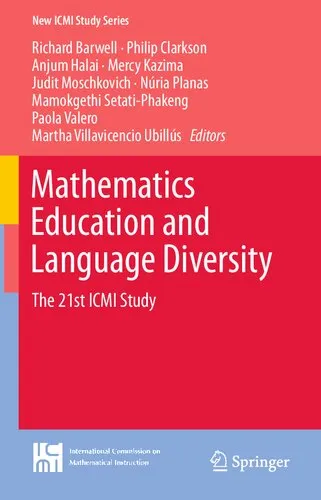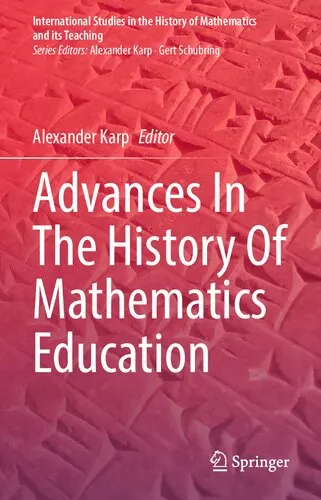Mathematics Education and Language Diversity: The 21st ICMI Study (New ICMI Study Series)
4.5
Reviews from our users

You Can Ask your questions from this book's AI after Login
Each download or ask from book AI costs 2 points. To earn more free points, please visit the Points Guide Page and complete some valuable actions.Related Refrences:
Introduction
Mathematics Education and Language Diversity: The 21st ICMI Study is a significant contribution to the field of mathematics education and a critical exploration of language diversity in the teaching and learning of mathematics. Edited by a passionate and accomplished team of scholars, including Richard Barwell, Philip Clarkson, Anjum Halai, Mercy Kazima, Judit Moschkovich, Núria Planas, Mamokgethi Setati-Phakeng, Paola Valero, and Martha Villavicencio Ubillús, the book highlights the intersections of multilingualism, multiculturalism, and mathematics education on a global scale.
This volume is part of the esteemed "New ICMI Study Series" and reflects the International Commission on Mathematical Instruction (ICMI)’s commitment to understanding the complex realities of mathematics education. With globalization and increasing migration shaping today’s classrooms, the role of language in mathematics education has never been more critical. This book unpacks the connections between mathematics and language in diverse sociocultural contexts, offering theoretical insights, practical approaches, and policy implications for educators, researchers, and policymakers.
Detailed Summary of the Book
The book comprises a series of carefully curated research studies, case studies, and theoretical frameworks aimed at illuminating the complex relationship between language diversity and mathematics education. It delves into topics such as bilingual and multilingual settings, the challenges of teaching mathematics in second or additional languages, and how language acts as both a resource and a barrier in diverse classrooms.
Contributors from across the globe present their findings on how teachers and learners navigate the dual demands of mastering mathematical concepts while managing language differences. The chapters are interdisciplinary, drawing on linguistics, education, and mathematics to examine how specific linguistic features impact learning experiences and mathematical understanding.
Notably, the discussion extends beyond mere teaching strategies; it addresses broader questions of language equity and social justice, exploring how systemic factors shape educational opportunities and outcomes for linguistically diverse students. From theoretical frameworks to classroom interventions, the book provides a comprehensive overview of the challenges and possibilities in this field.
Key Takeaways
- The role of language in learning mathematics is both powerful and complex, influencing not only comprehension but also identity and participation in learning communities.
- Multilingualism presents unique opportunities for mathematical understanding, as it allows learners to draw on multiple linguistic resources.
- Equity and inclusion are central concerns in mathematics education, requiring systemic changes to ensure that language diversity is viewed as an asset rather than a barrier.
- Innovative teaching strategies, such as translanguaging and code-switching, can foster deeper mathematical engagement and learning in diverse classrooms.
- Global perspectives, informed by case studies from different regions and educational systems, provide valuable insights into how language diversity can shape educational practices and policies.
Famous Quotes from the Book
"Language is not a neutral medium; in mathematics education, it carries not only the weight of concepts and procedures but also the social and cultural dimensions that give them meaning."
"Diversity in language is not a problem to be solved; it is a reality to be embraced in creating equitable and meaningful mathematical experiences."
"In the multilingual mathematics classroom, translanguaging offers a window through which students can access mathematical ideas in ways that are both personal and collective."
Why This Book Matters
Mathematics Education and Language Diversity: The 21st ICMI Study is pivotal in shaping how we think about education in contemporary times. In an increasingly interconnected world, educational systems must address the challenges and opportunities of linguistic diversity. This book provides a roadmap for navigating these complexities, ensuring that mathematics education remains inclusive and effective for all learners, regardless of their linguistic backgrounds.
By advancing theoretical and practical understandings, this volume equips educators, researchers, and policymakers with tools to create classrooms where linguistic diversity is celebrated rather than marginalized. It underscores the importance of revisiting long-held assumptions about language and mathematics, advocating for practices that prioritize equity and inclusivity. With its global perspectives, the book resonates beyond specific regional contexts to address universal issues in mathematics education.
Free Direct Download
Get Free Access to Download this and other Thousands of Books (Join Now)
For read this book you need PDF Reader Software like Foxit Reader
Accessing books through legal platforms and public libraries not only supports the rights of authors and publishers but also contributes to the sustainability of reading culture. Before downloading, please take a moment to consider these options.
Find this book on other platforms:
WorldCat helps you find books in libraries worldwide.
See ratings, reviews, and discussions on Goodreads.
Find and buy rare or used books on AbeBooks.



